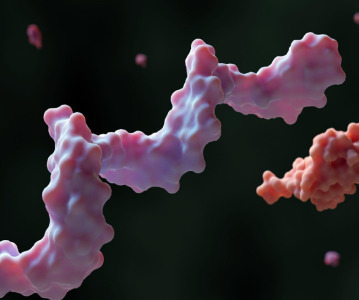Experimental treatment for Niemann-Pick disease type C1 appears safe, effective

NIH-led clinical trial suggests that drug slows progression of rare neurological disease.
An experimental drug appears to slow the progression of Niemann-Pick disease type C1 (NPC1), a fatal neurological disease, according to results of a clinical study led by researchers at the National Institutes of Health.
NPC1 is a rare genetic disorder that primarily affects children and adolescents, causing a progressive decline in neurological and cognitive functions. The FDA has not approved any treatments for the condition.
The drug, 2-hydroxypropyl-beta-cyclodextrin (VTS-270), is being tested under a cooperative R&D agreement, or CRADA, between NIH and Sucampo Pharmaceuticals. In April 2017, Sucampo acquired Vtesse, which previously had been developing VTS-270.
“The results are very encouraging and support continued development of VTS-270 for treating NPC1,” said Forbes D. Porter, clinical director at NIH’s Eunice Kennedy Shriver National Institute of Child Health and Human Development (NICHD) and the study’s senior author. “Compared to untreated patients we followed in an earlier study, participants who received VTS-270 scored better on a scale used to evaluate disease severity and progression, including elements such as speech, cognition and mobility.”
The study was a Phase I/IIa clinical trial designed to test the drug’s safety and effectiveness. A group of 14 participants, ranging from ages 4 to 23 years, received the experimental drug once a month at NIH for 12-18 months. Another group of three participants received the drug every 2 weeks for 18 months at Rush University Medical Center in Chicago. Initially, participants were divided into groups receiving different doses of the drug, but after observing that the drug was safe and well-tolerated by those receiving the highest doses, the researchers increased dosing for all participants. Their progress was compared to a previous group of 21 NPC1 participants enrolled in an earlier study that documented disease progression.
The researchers did not observe any serious adverse outcomes related to the drug. However, the participants, most of whom had already experienced hearing loss because of the disease, had additional hearing loss after treatment. Earlier studies had shown that the treatment carries the risk for hearing loss. In the current study, hearing loss was compensated with hearing aids, which enabled participants to go about their daily lives.
Because NPC1 symptoms result from cholesterol buildup in brain cells, the researchers also measured cholesterol metabolism in the participants’ central nervous system. The researchers found that after treatment, a molecule derived from cholesterol metabolism in neurons, 24(S)-hydroxycholesterol, had increased. In addition, most participants had lower levels of two proteins indicative of brain injury, FABP3 and calbindin D, implying that there was less damage in the brain. According to the study authors, these results suggest that VTS-270 can improve cholesterol metabolism in neurons, thereby targeting the root of the problem.
The researchers also evaluated the drug’s effectiveness using a neurological severity score, where higher scores indicate more severe effects from the disease. Compared to an earlier group of patients who had not received the drug, VTS-270-treated participants had lower scores in measures of cognition and speech, with mobility scores also trending lower. The authors believe these differences indicate that treatment with the drug can stabilize or slow disease progression.
NICHD researchers led the design, data collection and analysis of the Phase I/IIa clinical trial. VTS-270 was provided by Janssen Research & Development, a Johnson & Johnson company. Researchers are now working on a randomized, controlled phase 2b/3 clinical trial (NCT02534844) that has been approved by the FDA and the European Medicines Agency. The trial is sponsored by Sucampo, and its results will help determine which symptoms are most responsive to the drug and provide information for refining the dose and dosing frequency. The goal of this trial is to obtain regulatory approval of VTS-270.
Related News
-
News Google-backed start-up raises US$600 million to support AI drug discovery and design
London-based Isomorphic Labs, an AI-driven drug design and development start-up backed by Google’s AI research lab DeepMind, has raised US$600 million in its first external funding round by Thrive Capital. The funding will provide further power t... -
News AstraZeneca to invest US$2.5 billion in Beijing R&D centre
Amid investigations of former AstraZeneca China head Leon Wang in 2024, AstraZeneca have outlined plans to establish its sixth global strategic R&D centre in China. Their aim is to further advance life sciences in China with major research and manufact... -
News Experimental drug for managing aortic valve stenosis shows promise
The new small molecule drug ataciguat is garnering attention for its potential to manage aortic valve stenosis, which may prevent the need for surgery and significantly improve patient experience. -
News How GLP-1 agonists are reshaping drug delivery innovations
GLP-1 agonist drug products like Ozempic, Wegovy, and Mounjaro have taken the healthcare industry by storm in recent years. Originally conceived as treatment for Type 2 diabetes, the weight-loss effects of these products have taken on unprecedented int... -
News A Day in the Life of a Start-Up Founder and CEO
At CPHI we work to support Start-Up companies in the pharmaceutical industry and recognise the expertise and innovative angles they bring to the field. Through our Start-Up Programme we have gotten to know some of these leaders, and in this Day in the ... -
News Biopharmaceutical manufacturing boost part of new UK government budget
In their national budget announced by the UK Labour Party, biopharmaceutical production and manufacturing are set to receive a significant boost in capital grants through the Life Sciences Innovative Manufacturing Fund (LSIMF). -
News CPHI Podcast Series: The power of proteins in antibody drug development
In the latest episode of the CPHI Podcast Series, Lucy Chard is joined by Thomas Cornell from Abzena to discuss protein engineering for drug design and development. -
News Amgen sues Samsung biologics unit over biosimilar for bone disease
Samsung Bioepis, the biologics unit of Samsung, has been issued a lawsuit brought forth by Amgen over proposed biosimilars of Amgen’s bone drugs Prolia and Xgeva.
Recently Visited
Position your company at the heart of the global Pharma industry with a CPHI Online membership
-
Your products and solutions visible to thousands of visitors within the largest Pharma marketplace
-
Generate high-quality, engaged leads for your business, all year round
-
Promote your business as the industry’s thought-leader by hosting your reports, brochures and videos within your profile
-
Your company’s profile boosted at all participating CPHI events
-
An easy-to-use platform with a detailed dashboard showing your leads and performance







.png)